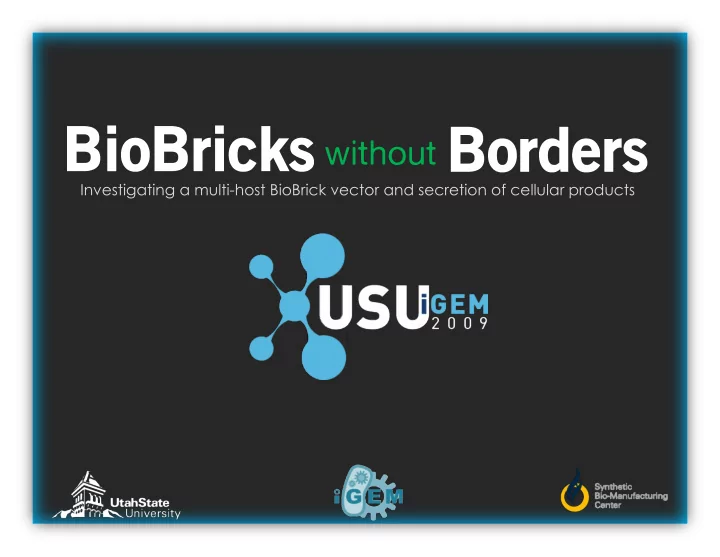

Investigating a multi-host BioBrick vector and secretion of cellular products
The Team
Team Roster • High School Outreach: 5 High School Students – 2 different local high schools – 1 high school foreign exchange student • 3 Graduate Advisors • 5 Undergraduate Students
Our Home - Utah, USA
Logan, UT, USA
Challenges in Biomanufacturing • Secretion – - Allows cheaper product recovery - Provides basis for continous production • Broad-Host-Range Vectors – - Opens BioBrick library for use in microorganisms other than E. coli Photobioreactor for Biomanufacturing
Broad-Host- Secretion Range Vector
Investigating Secretion: Bioplastics • Polyhydroxyalkanoates (PHAs) – Class of biodegradable plastics – Produced by microorganisms – Useful material properties • Issue: Cost – 50% of cost due to product recovery TEM image of PHB in Ralstonia eutropha taken at Utah State.
Secretion Based Recovery • Signal Peptides – Target proteins for secretion • Phasin (PhaP) – Proteins associated with PHA granules • Silver fusion
Secretion Objectives: • Create library of BioBricks for secretion – Signal Peptides – Phasin – Green fluorescent protein • Demonstrate functionality of parts
Approach - Parts Needed
Approach - Signal Peptides • Five signal pep;des synthesized – Silver fusion compa;ble • Represent most common secre;on pathways • Constructed and sequenced
Approach – Proteins • Phasin: – Genomic DNA of R. eutropha – Mutation of PstI site • GFP: – New Silver fusion compatible part – Larger Stokes shift (Ex. 395 nm, Em. 509 nm) – Easy to monitor – Similar in size to phasin
Testing GFP • Testing – Fluorescence Emission – SDS-PAGE (27 kDa band) GFP
PHB Production • Plasmid: phbCAB genes • Confirmed using 1 H NMR 1 H NMR of PHB in E . coli.
Phasin Secretion • GeneIII/phasin composite • Analyzed supernatant • Phasin size: about 22 kDa • Indicates secre;on
Secretion Broad-Host- Range Vector
Breaking Host Borders Eliminate constraint of BioBrick library to E. coli (Photosynthetic Microbe)
pCPP33 • Stable in P. pu7da • Resistance to tetracycline • Characterized mul;ple cloning site
BioBrick Compatibility
Summary of Project Results • Constructed and sequenced: 49 BioBricks – 8 with demonstrated functionality – Some of our favorites: • Secretion of phasin • pCPP33 broad-host chassis converted to BioBrick format – Transferred successfully into R. sphaeroides , P. putida , and Synechocystis PCC6803
Conclusions BioBrick Borders were broken by 1. Designing secre;on systems 2. Conver;ng a broad‐host‐range vector to BioBrick format Significance in biomanufacturing
We would like to thank our Sponsors QUESTIONS?
Genetic Composition of BHR-V • Classed as mobilizable plasmids • Contain some tra genes (mob) • OriT (RP4 used in this study) • Unstable without RP4 helper plasmid
Recommend
More recommend